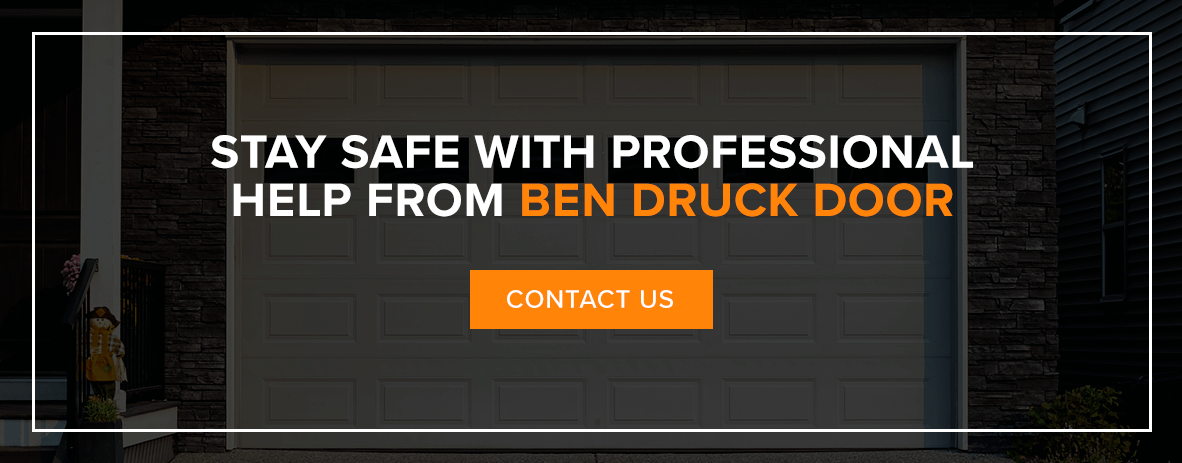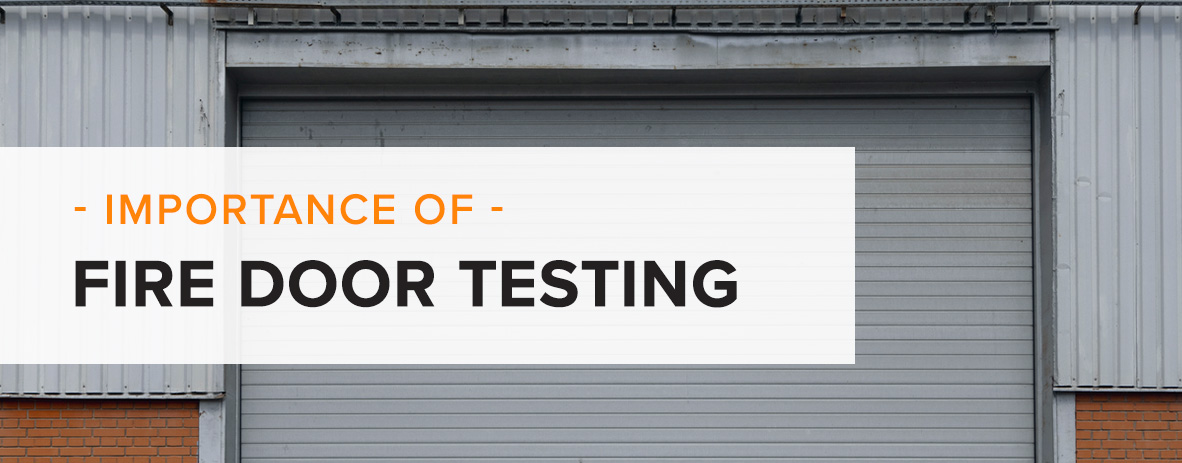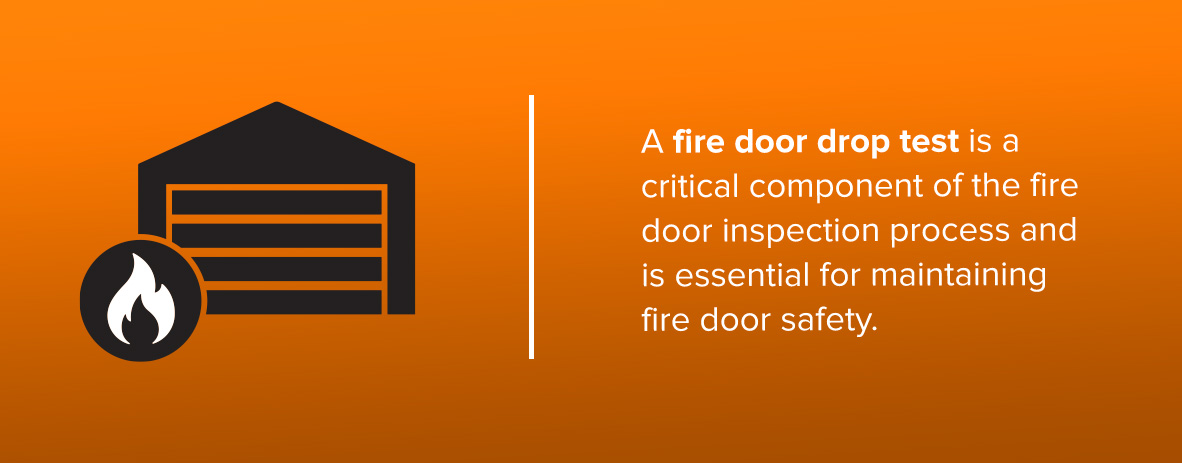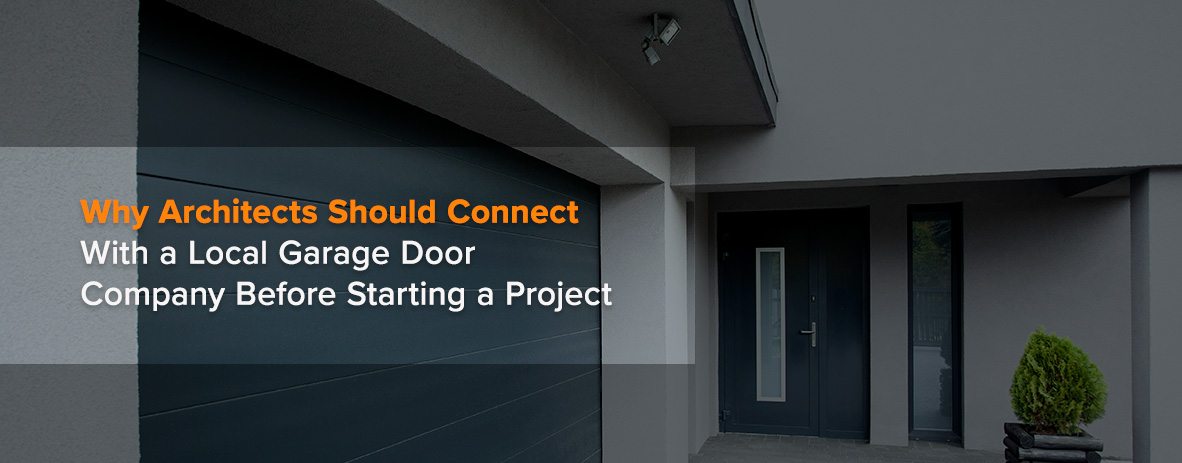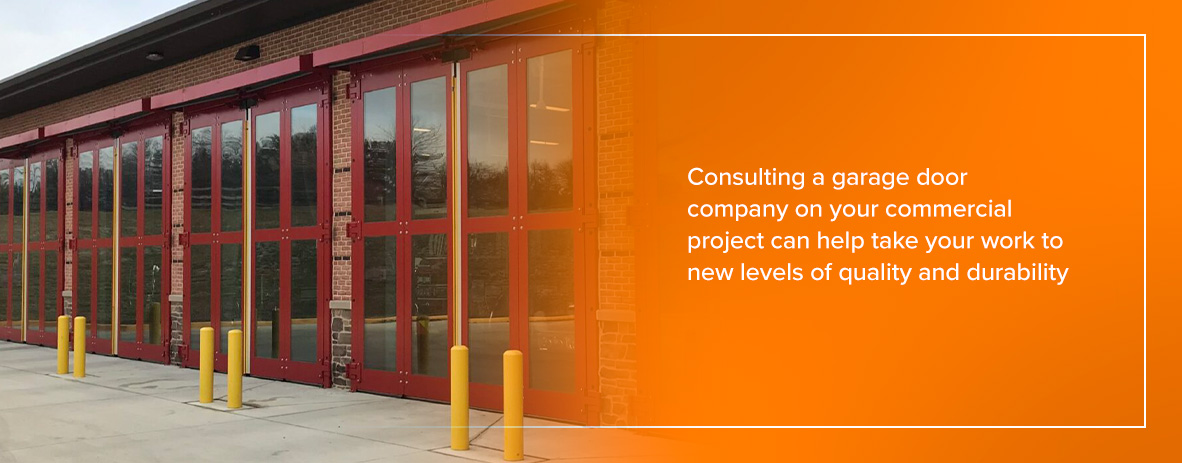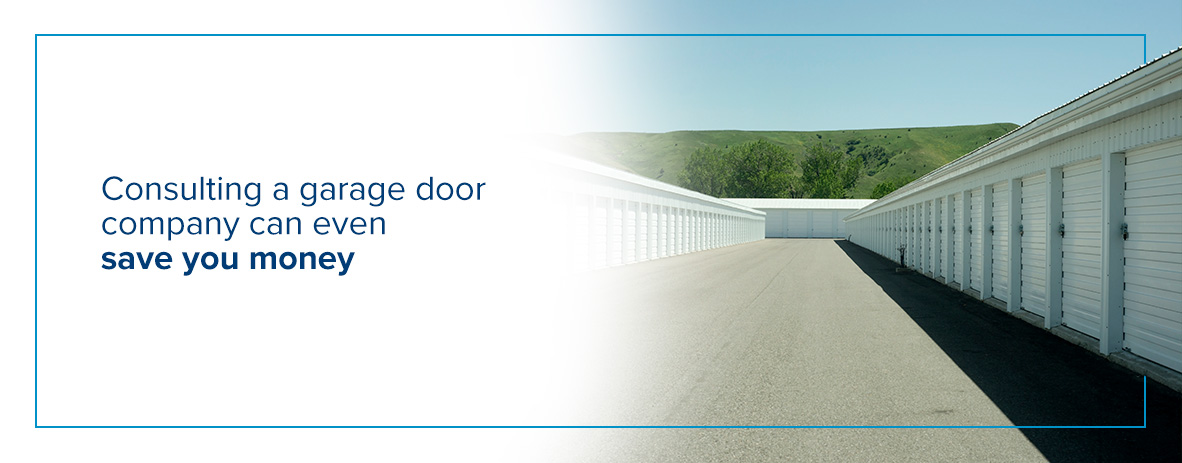Advantages of Commercial Metal Garage Doors
What Are the Advantages of Commercial Metal Doors?
Commercial metal doors can withstand frequent heavy use, protect people and property, and be custom-made to meet your facility’s look and safety codes. They also need little upkeep, which can save you money on repair and service over time compared to other options.
Here’s a closer look at the benefits of metal doors for businesses and what you should keep in mind when installing them.
Built to Last
A metal door can withstand the strenuous demands of commercial and industrial settings. Since they’re less likely to break down or malfunction due to frequent heavy usage, these doors minimize downtime in your business operations.
The physical strength of metal doors also makes them weather-resistant. Since metal is nonporous, metal doors don’t absorb water like wood. They also remain sturdy even in areas that experience strong winds and storms. Manufacturers also use finishes like epoxy coatings, powder coating, specialized oil-based and acrylic latex paints for metal, and other methods, like galvanization, to boost the weather resistance of metal doors.
Although metal doors are generally sturdy, their durability level will depend on the type of metal used. Steel and aluminum are the most common metals used to build overhead doors.
- Steel doors: Commercial and industrial steel doors are stronger and more durable than aluminum doors. They can last many years, but can rust if not properly coated or if the finish gets damaged.
- Aluminum doors: This material is lighter than steel and dents easily in comparison. Unlike steel doors, aluminum doors are corrosion-resistant, making them a good choice for businesses in coastal or humid areas.
Better Safety and Security Features
Metal doors are heavy and harder to tamper with or break through. Manufacturers today also build doors with advanced security systems like magnetic locks, card readers and other electronic access control systems, ensuring that only authorized users can access your business.
If intruders can’t get into your property, you can have peace of mind knowing your assets, employees and customers are safe. When employees feel safe, they can put more effort into their work and serve customers better. Customers who feel secure and receive better service are more likely to return to your business.
Most commercial metal doors are also fire-rated according to standards set by the National Fire Protection Association (NFPA). Doors that are rated for fire and safety have been designed to slow the spread of fire and smoke, giving people enough time to evacuate a building safely in case of an emergency. Firefighters will also have more time to contain the fire before it spreads and ruins the rest of your business.
Cost-Effective
Many modern metal doors are manufactured with insulated cores, which reduce the amount of heat that passes through them. With minimal heat transfer, indoor temperature becomes more stable, reducing the workload on your heating, ventilation and air conditioning (HVAC) system. Always ask for a thermal rating when comparing metal doors. A higher rating means better insulation and greater long-term savings.
Another way metal doors cut operational costs for your business is their low maintenance. Since they’re resistant to warping, cracking and rotting, these doors can last longer without repairs. Fewer repairs mean you’ll spend less money on fixing the door, and your business will experience minimal downtime associated with repairs.
Reduce Noise
Metal doors are heavy and solid, so they naturally block most unwanted sound from passing through. Because of this, they are often used in places where controlling noise is important. For example:
- A recording studio that needs quiet to capture clear sound.
- Office buildings that need calm spaces for concentration.
- Factories use them to block loud machinery noise and more.
Metal doors help create a better environment for work or study by reducing how much noise leaks in or out. Employees can focus more easily, feel less distracted and be more comfortable in their workplace.
Sustainable
Metal, specifically steel, is one of the most recycled materials in the world, which means that a metal door can be recycled instead of going to a landfill when it eventually reaches the end of its long lifespan. Recycling helps reduce waste and preserve natural resources. Many manufacturers also use eco-friendly methods and materials when producing steel doors, which makes them an even more sustainable option.
Versatile Design and Customization Options
Metal doors can be made to fit many different needs, both practical and decorative, which is why they work well in industrial or commercial settings. You can choose from a variety of colors, finishes, window inserts and panel layouts to achieve the look you want. Whether it’s a clean, modern style for an office building or a tougher, industrial look for a warehouse, overhead metal doors can be customized to fit most commercial spaces.
How to Install Heavy Metal Doors for Commercial Applications
The only way to experience all the advantages of a commercial metal door is to ensure it’s installed properly. A poorly installed frame or misaligned hardware can create security gaps, reduce energy efficiency and cause safety hazards. Here’s what a correct installation process includes:
- Preinstallation check: Measure the opening, confirm the wall type and determine which way you want the door to swing. Also check hardware, power access for controls and any fire or accessibility requirements.
- Frame setup: Level and secure the frame with anchors suited to the wall type.
- Door and hardware installation: Hang the door on its hinges and adjust it so the gaps are even. Install locks, panic bars, closers or other hardware following the manufacturer’s instructions. If the door has alarms or access control wiring, protect it and test everything before finishing.
- Sealing and weatherproofing: Add weatherstripping, a door sweep and a proper threshold to block air and water leaks. Seal around the frame to keep the opening tight.
- Final testing: Open and close the door multiple times to make sure it moves smoothly, latches properly and that the openers work at the right speed. Check alarms and access systems, and ensure that the door meets all fire and safety requirements.
Secure Your Business With Ben Druck Door
Aluminum and steel doors for commercial applications offer long-lasting strength, support for modern security systems, fire protection, weather resistance and low maintenance. With proper installation, they also lower costs and enhance overall safety.
Ben Druck Door supplies, installs and services commercial door systems throughout southcentral Pennsylvania and northern Maryland. Our team ensures doors are the correct size, specifies the right hardware, and completes installations that pass inspection and perform reliably. We can also perform fire door testing and inspection to ensure the safety of your business.
Ready to start your project? Contact Ben Druck Door for a professional consultation and installation today.
Garage Door Repair Safety
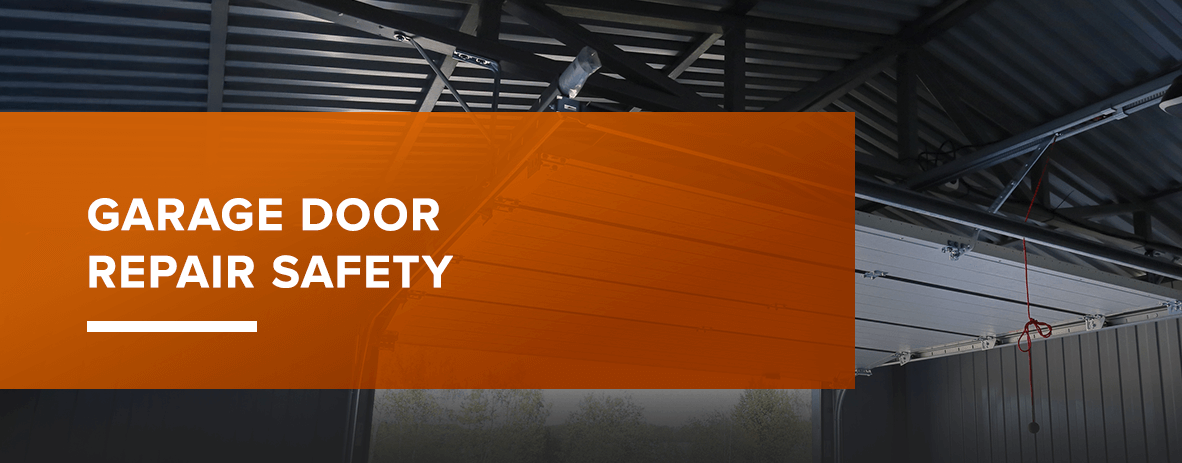
Garage doors do a lot of heavy lifting. They help secure your property, protect your belongings and make daily routines a little easier. But because they’re used so often and built with high-tension parts, garage doors need to be treated with care.
If you own a home or manage a commercial property, knowing how to stay safe around garage doors is just good practice. June is Garage Door Safety Month, making it a great time to check in on safety habits and repair practices that keep your garage door working the way it should.
Understanding Garage Door Safety
Garage doors aren’t just large panels on hinges — they’re made up of cables, springs, rollers and motors that all work together to lift a lot of weight. If something’s off, it can cause more than just inconvenience.
Poorly handled repairs or worn-out parts can lead to serious injury. Garage door springs, for example, are tightly wound and under a lot of tension. If one breaks or gets adjusted the wrong way, it can snap with force. That’s why it’s important to treat repairs with care and to know your limits when it comes to DIY work.
Families with young kids and property managers responsible for multiple units have even more reason to stay proactive. Children may not realize that a moving garage door isn’t a place to play. For landlords and facility managers, being aware of safety risks is part of maintaining a secure and functional space.
Recognizing Garage Door Safety Month
Each June, garage door professionals and safety organizations promote Garage Door Safety Month. It’s a national effort to spread awareness and provide simple, helpful reminders about how to keep garage doors operating safely.
Getting involved doesn’t take much. You might start by testing your door’s auto-reverse feature, inspecting the tracks or scheduling a tuneup. The goal is to make safety a regular part of home or property maintenance, just like checking smoke detectors or changing HVAC filters.
Important Garage Door Safety Tips
A few easy-to-follow garage door safety rules can go a long way in keeping everyone safe:
- Stay clear of the door when it’s moving.
- Keep remote openers away from young children.
- Leave high-tension repairs — like springs and cables — to professionals.
- Test your auto-reverse feature every month using a sturdy object, like a wooden board.
- Use the manual release when the door is fully closed.
- Use motion-sensor lights to brighten up entry points for safer access at night.
- Upgrade older systems with modern features, like photo-eye sensors or backup batteries.
Technicians follow detailed protocols to stay safe while working on these systems. Homeowners and property managers can support that safety by knowing which tasks are best left to someone trained and equipped for the job.
Common Mistakes to Avoid During Garage Door Repairs
Some repairs might look simple at first glance, but mistakes can happen easily. Trying to adjust parts under tension without the right tools can lead to injuries or bigger repair needs.
Garage door repair calls for more than a basic toolbox. Technicians use specific tools designed to work safely with high-tension systems, including:
- Winding bars for spring adjustments
- Cable pullers and locking pliers to stabilize components
- Safety gear, like gloves and eye protection
- Digital levels and torque tools for fine-tuned adjustments
These tools help keep garage door repairs steady and safe.
Another common mistake is skipping inspections or ignoring early signs of trouble, like strange noises or jerky movements. Small issues can build up over time without proper attention.
Emergency Procedures and What to Do If Something Feels Off
If your garage door stops midway, won’t respond or makes a loud sound, it’s best to pause before trying anything. Start by turning off the power if that’s safe to do, then keep the area clear and reach out for support. A stuck or lopsided door can seem like a small issue, but moving or forcing it may cause damage. Having a plan to call a trusted technician can help you stay calm and safe.
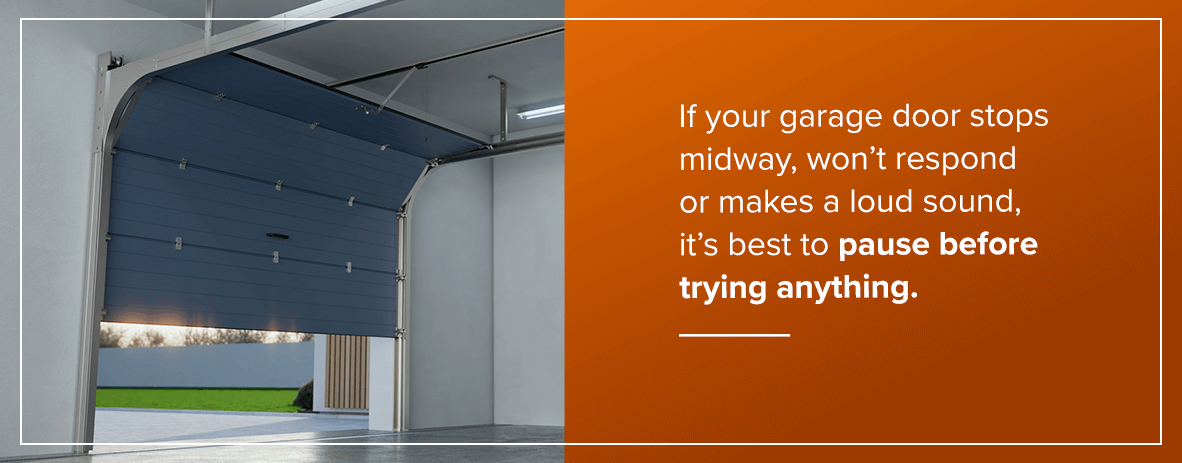
Regulatory Compliance and Safety Standards
Commercial and multi-unit properties often have local or state codes tied to garage door systems. These rules might involve:
- Posting instructions near manual releases
- Scheduling regular inspections
- Using openers that meet recognized safety standards
Working with a knowledgeable team that understands your area’s requirements makes it easier to stay in step with these standards.
Maintenance Tips to Promote Garage Door Safety
Routine checkups are one of the simplest ways to keep your garage door safe.
You don’t need to be a technician to give your system a quick once-over each month. Look for signs of wear on cables and rollers, check that the tracks are straight and listen for anything that sounds off. A little lubricant on the rollers, hinges and springs every few months can help keep your garage door system’s components moving smoothly. Beyond supporting safety, these small changes can help your door last longer and reduce the chance of surprise repairs.
While you can handle some maintenance on your own, it’s worth scheduling a professional inspection once a year to make sure everything is working as it should.
When to Call a Professional
If you’re not sure what’s going on with your garage door, that’s usually the right time to ask for help. Some signs of trouble that a technician should take a look at include:
- A door that closes too fast or slams
- Springs or cables that look loose or broken
- Loud or grinding noises
- A door that’s off track or looks uneven
Waiting things out can lead to more damage. Getting the right support early helps keep your property safe and your garage door working like it should.
Stay Safe With Professional Help From Ben Druck Door
Ben Druck Door has been helping homeowners and property managers with reliable, innovative and turnkey garage door service for years. From quick inspections to detailed repairs, we know what it takes to work safely with garage doors of all sizes and systems. Our team values clear communication, quality workmanship and lasting results.
If you’ve been putting off a garage door checkup, June is the perfect time to take care of it. Call us or schedule a service with us online. We’re happy to offer inspections and answer questions about safety upgrades, maintenance tips or new installations. Our goal is to help you feel confident and secure every time your garage door opens or closes.
Linked sources:
https://bendruckdoor.com/collections/residential/garage-doors/
https://bendruckdoor.com/service-repairs/repairs/
https://bendruckdoor.com/service-repairs/service-maintenance/
https://bendruckdoor.com/contact-us/request-service/
Aluminum Versus Steel Garage Doors
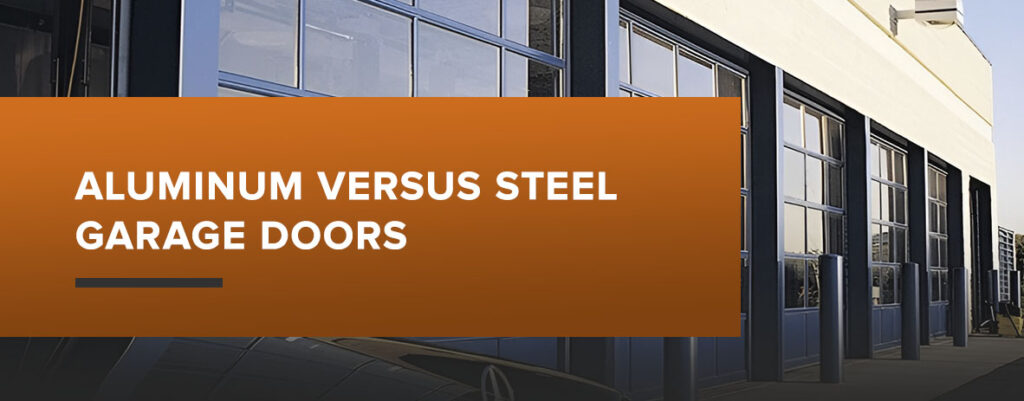
If you’re considering replacing your garage door or installing one for your client, you may be wondering about your options. After all, garage doors come in different materials that impact their qualities. When it comes to exceptional strength, durability and low maintenance, metal garage doors top the list.
On the market, however, the options for metal doors are steel and aluminum. While they are both metals, steel and aluminum are distinct with unique qualities, strengths and weaknesses. Our guide on aluminum vs. steel garage doors will help you determine the best door for your needs.
What Are Steel and Aluminum Garage Doors?
Steel garage doors are made from galvanized steel, which is notable for its excellent rust resistance. While steel can be heavy, the panel’s varying gauges help with balancing weight and durability. These qualities make steel garage doors desirable in terms of strength, durability and weather resistance.
Aluminum garage doors have some qualities that are similar to steel, such as strength and weather resistance. They also boast distinct features like light weight and corrosion resistance. Despite their differences, both metals come with modern qualities like energy efficiency, custom designs and noise reduction.
Pros and Cons of Steel Garage Doors
Here are some of the advantages and downsides of steel garage doors:
The Pros
Strength and durability: Steel is a robust metal with exceptional strength and can withstand harsh conditions associated with daily use. The metal’s toughness makes these garage doors resistant to general wear and tear, heavy impact, and rough weather. As a result, steel doors can endure years of use, often offering a long life span.
Low maintenance: Besides the annual servicing recommended for all garage doors, steel doors require minimal maintenance. Usually, all the door needs is occasional cleaning and lubrication.
Energy efficiency: Steel is one of the metals with low thermal conductivity, which means it can help retain cooler internal temperatures in summer by transmitting less heat. The same also applies in winter, as the door prevents excess heat loss. Aside from steel’s natural qualities that promote energy efficiency, insulated steel garage doors further contribute to energy savings.
Weather resistance: Steel garage doors can withstand extreme weather conditions without warping, breaking and cracking.
Rust resistance: Galvanized steel has a zinc layer that makes it resistant to corrosion and degradation caused by moisture damage.
The Cons
Weight issues: Steel is one of the heaviest materials used in constructing garage doors. Besides making garage door openers work harder, the weight can damage weaker frames.
Denting: Steel panels are vulnerable to denting, especially thinner gauges. Accidental bumps and impacts from hail and stones can create dents that are challenging to rectify without professional assistance.
Heat transfer: While steel has a low heat conductivity compared to many metals, its conductivity level is still good. If the outside temperatures are extreme, steel will transfer the heat into the garage unless the door has proper insulation.
Pros and Cons of Aluminum Garage Doors
Aluminum garage doors share some similarities and benefits with steel. Here is a breakdown of the pros and cons of aluminum garage doors:
The Pros
Lightweight: Aluminum is a lightweight metal, which makes it an excellent choice if you want a metal garage door that puts less strain on the door opener. It’s also the lightest metal garage door for manual operation.
Corrosion-resistant: Unlike steel, aluminum is naturally resistant to corrosion due to its reaction with oxygen, which forms a tough, non-reactive surface layer. Resistance to corrosion makes aluminum garage doors ideal in harsh environments.
Low maintenance: Like steel, aluminum garage doors require little upkeep. Occasional cleaning to remove dust and debris is generally enough.
Customizable: Aluminum is a highly customizable metal, which leads to versatile garage door options with unique features that match diverse architectural styles. Aluminum is often paired with glass for maximum light and visibility.
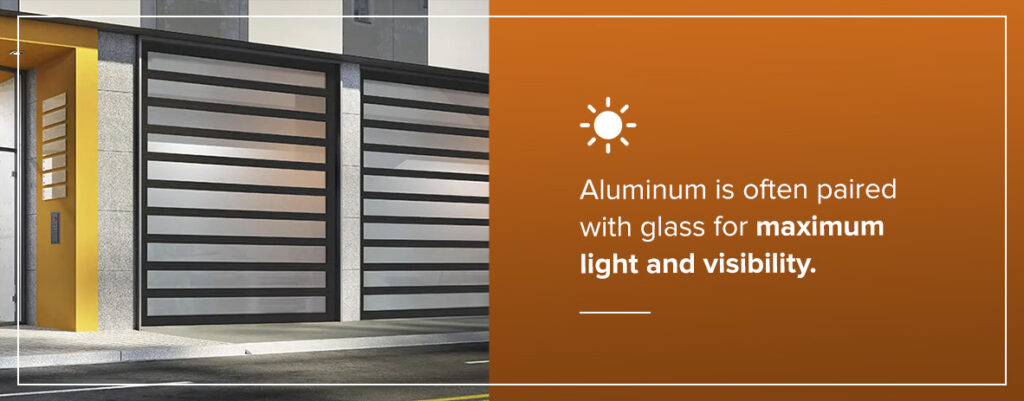
The Cons
Prone to dents: Metals are susceptible to dents from impact, and since aluminum is softer than steel, it’s easier to dent.
Low energy efficiency: Aluminum has low insulation properties, which makes it less energy-efficient unless the garage door is lined with insulation materials.
Heat sensitivity: Unlike steel, extreme summer heat can soften aluminum panels, making them more vulnerable to warping and denting.
Steel vs. Aluminum Garage Doors: Comparison
As you can see, steel and aluminum garage doors share many similarities and have a few unique qualities. But how do these qualities and strengths compare side by side? Here are some of the best qualities a garage door can offer and how both metals score for each:
Security Features
Steel is inherently strong, a trait that makes steel garage doors more robust and secure than aluminum. These doors are resistant to impact and can withstand brute force. As a result, they have a significant security advantage over their aluminum counterparts. Since aluminum is lightweight and malleable, it’s more likely to give in to forced entry.
However, both types of garage doors can be reinforced with other materials and fit with additional security features like locking mechanisms and smart technology to improve security.
Durability
Steel is generally considered more durable than aluminum due to its sheer strength and resistance to damage. However, other factors impact durability, such as corrosion and maintenance needs. Aluminum excels in both factors as it’s resistant to corrosion and doesn’t need frequent maintenance. As such, both materials have a reliable resistance to wear and tear.
Longevity
While both steel and aluminum garage doors offer durability, they differ in longevity based on their use and the environment. The toughness of steel doors makes them an ideal long-term option for heavy-use applications, but they may not fare well in rust-prone areas like coastal regions. Aluminum doors are a long-lasting solution where water damage and corrosion are a concern. However, since it’s softer than steel, the door may not last as long with heavy use.
Performance
Two of the key factors that impact performance are durability and ease of use. While steel offers superior strength and can withstand rough weather conditions, its weight makes it less efficient for daily operation as it strains the garage door opener. It’s also more challenging to operate manually.
Due to its softness, aluminum is less durable than steel. However, aluminum doors score high in terms of performance because they are lightweight, easier to operate and resistant to corrosion.
Fire Resistance
Today’s fire-rated garage doors are key to protecting lives and properties, but their level of fire suppression varies. Steel offers superior fire resistance because it has a higher melting point and doesn’t contribute to spreading the fire. Aluminum doors can also withstand heat but at lower temperatures than steel.
Choosing Between Steel and Aluminum Garage Doors
The choice between steel and aluminum doors largely depends on your preference, budget and environment. Whether you choose steel or aluminum garage doors, you’ll benefit from features unique to metal doors, such as durability, longevity and unparalleled performance.At Ben Druck Door, we carry commercial and residential overhead doors from top brands in the industry. We also provide installation and door maintenance services as well as a free consultation to help you make the best decision for your needs. Contact Ben Druck Door for a professional consultation and installation!
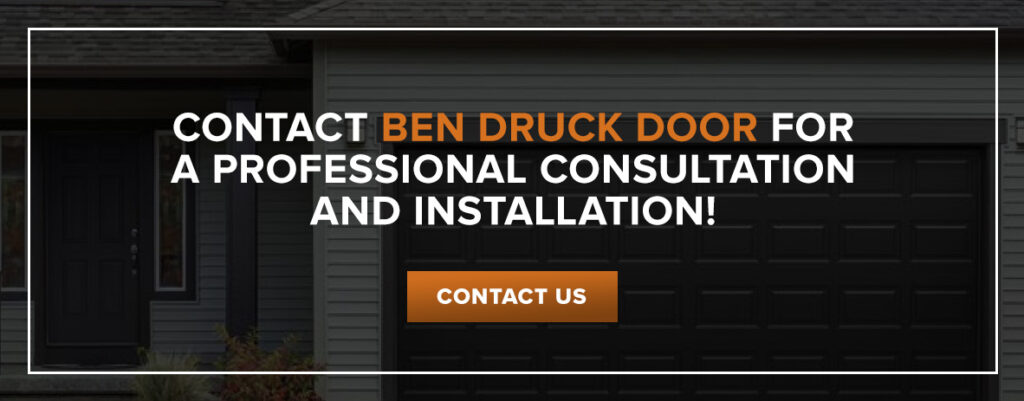
Commercial Garage Door Types and Materials
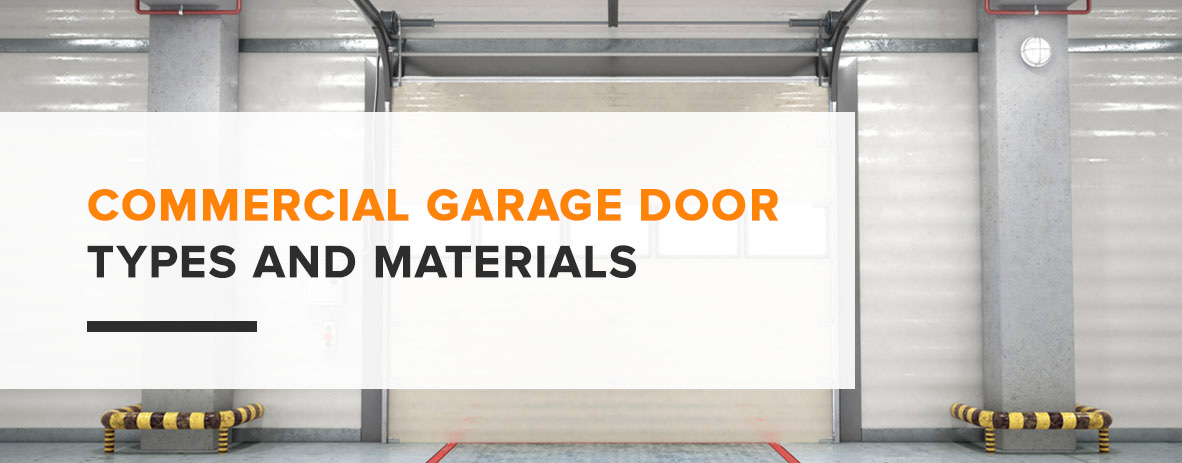
While residential garage doors can be customized with some of the same features as commercial ones, commercial garage doors are designed specifically for applications in businesses, warehouses, manufacturing plants, municipalities and other industries.
Like residential doors, commercial garage doors are available in different materials and customization options. They are generally less concerned with style and appearance and prioritize function and efficiency. However, you can customize some to match or complement your building’s appearance.
Types of Commercial Garage Doors
Different types serve different functions, like fire protection or increased security. Some commercial and industrial door solutions serve multiple purposes at once. These are the most common overhead doors and their applications.
Roll-Up and Rolling Doors
Roll-up sheet doors are made of several panels of sheet metal, typically steel or aluminum, with a special groove and guide track design that allows the door to roll up vertically as a single, continuous sheet. They’re a good fit for facilities with limited overhead space because they do not arc like sectional doors. Many service doors in commercial settings fall into this category.
Rolling overhead garage doors, also called coiling doors, are a similar option. They are made of metal slats that form a compact overhead coil as it opens. They’re a popular alternative to sectional garage doors because they don’t require as much backroom — a term that refers to the distance from the door to the back interior wall.
Both roll-up and rolling door varieties are durable, rugged and have high-cycle and fire door options.
High-Cycle Doors
High-cycle doors are a type of rolling door built with stronger, heavier-duty materials and components than standard ones. They’re designed for frequent use, withstanding hundreds of cycles each hour — high-cycle doors from Ben Druck Door are tested and rated for a million lifetime openings.
You can combine high-cycle doors with high-speed technology if you need your door to open and close faster than standard offerings. This is common for climate-controlled and maximum security facilities.
Fire-Rated Doors
Fire-rated doors are essential in high-risk commercial environments, even if you don’t deal with flammable or explosive materials. Depending on your industry, you might be required to choose a fire-rated garage door to remain compliant with local and federal codes.
What sets them apart from non-fire doors is the use of flame-resistant materials, such as steel, and the addition of self-closing mechanisms to create a secure barrier. Some have other features, like auto reset and auto open. Their primary purpose is to slow the spread of fire and smoke, allowing employees and visitors more time to escape the facility and minimizing the extent of the damage. Because they’re so durable, these doors are also a great option for enhancing security against unauthorized access.
You might install a fire-rated door in one or more of the following locations:
- Stairwells
- Corridors and hallways
- Openings between separate fire zones
- Storage units housing combustible or toxic materials
- Mechanical rooms
- In designated areas along the planned egress route
- Parking garages
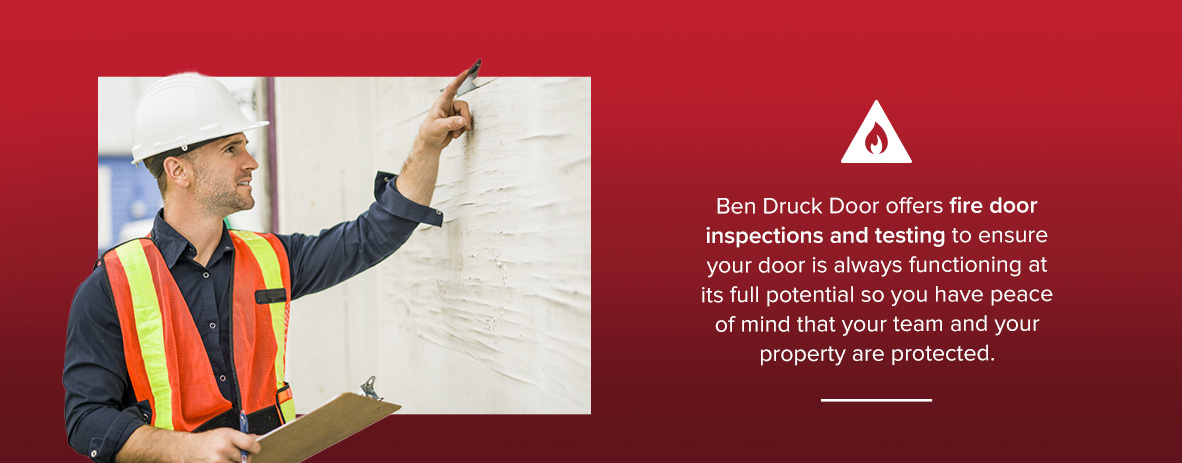
Fire doors must be inspected annually to remain compliant. Ben Druck Door offers fire door inspections and testing to ensure your door is always functioning at its full potential so you have peace of mind that your team and your property are protected. One part of this service is the drop test, which is where an experienced technician evaluates how quickly and effectively the door closes and latches without interference.
Sectional Doors
Sectional doors have horizontal panels joined by hinges, allowing the door to open and close along an arched path. If you’ve got a garage door at home, it’s likely a sectional one. The door lays parallel to the ceiling when it’s open, so ample overhead space is essential. Ensure the opening and closing path is free from obstructions like sprinklers, lights and ductwork.
Liking rolling doors, sectional doors and their features can be either manual or automatic. They’re also highly customizable — you can add features like insulation for noise and temperature control and windows or see-through panels to let natural light in.
Specialty and Custom Doors
Specialty doors may fall under any of the above categories but are for specific applications like security or interior security. Examples include:
- Security grilles.
- Blast-resistant doors.
- Four-fold doors.
- Vertical bifold doors.
- Countertop coiling grilles.
Ben Druck Door specializes in providing custom designs if you need a commercial door with unique requirements.
How to Choose the Right Commercial Garage Door
The best commercial overhead door for you depends on several factors. Here’s an easy way to break down your options.
1. Consider the Door’s Purpose
Start by clarifying what purpose the door will serve at your facility. While this varies greatly between different industries, common applications include:
- Entry points for receiving and unloading freight.
- Vehicle access at auto repair and detailing shops.
- Self-storage and bulk storage facilities.
- Parking garage entry and exit points.
- Cold storage facilities.
- Secured entrances for law enforcement vehicles.
- Fire and ambulance stations.
- Storage for maintenance vehicles and supplies.
- Car wash service bays.
Once you’ve identified its main use, list all the necessary characteristics it should have to complete that task. Is security your top priority, or is the door’s visual appeal more important? Should it have insulating properties for better temperature control? How often will it be used on an average day — enough that you may benefit from a high-cycle option? How much ceiling and backroom space are you working with?
2. Prioritize Fire Safety Compliance and Local Building Codes
Contact your local building authority to determine which building and fire codes you must meet before choosing a door. You might also be subject to the following standards:
- National Fire Protection Association: NFPA 80 establishes fire safety standards for fire doors and protective openings, while the Life Safety Code in NFPA 101 has guidelines for construction, protection and occupancy to minimize the effects of certain hazards, like fire.
- International building and fire codes: The International Building Code (IBC) and International Fire Code (IFC) have helpful guidance for protecting life and property across industries.
- Occupational Safety and Health Administration: OSHA has several standards for fire safety that apply to all workplaces in the United States.
- American National Standards Institute: ANSI has several standards that may apply to the construction and selection of commercial garage doors, such as ANSI/UL 325 and ANSI A156.1.
You should also reach out to your insurance provider to see if they have any requirements for coverage, such as fire-rated doors or security enhancements.
3. Choose the Right Materials
Most commercial garage doors are constructed using steel or aluminum because of metal’s durability. When choosing between steel and aluminum doors, note these differences:
- Steel: Steel is the perfect choice for rugged industrial facilities or those that experience high traffic and frequent use. It offers more security and natural insulation than aluminum because it’s thicker — this also contributes to a higher initial investment. While steel itself isn’t corrosion-resistant, it can be coated with certain finishes that protect it against rust and oxidation.
- Aluminum: Aluminum is lightweight, often making it a lower initial investment than steel. It’s naturally corrosion-resistant, which is a better option for wet or humid environments. These doors are less secure than steel because the material isn’t as strong and dense.
Both materials are ultimately recyclable and can be customized with different design and control features.
Trust Ben Druck Door for Your Commercial Garage Door Installation and Servicing
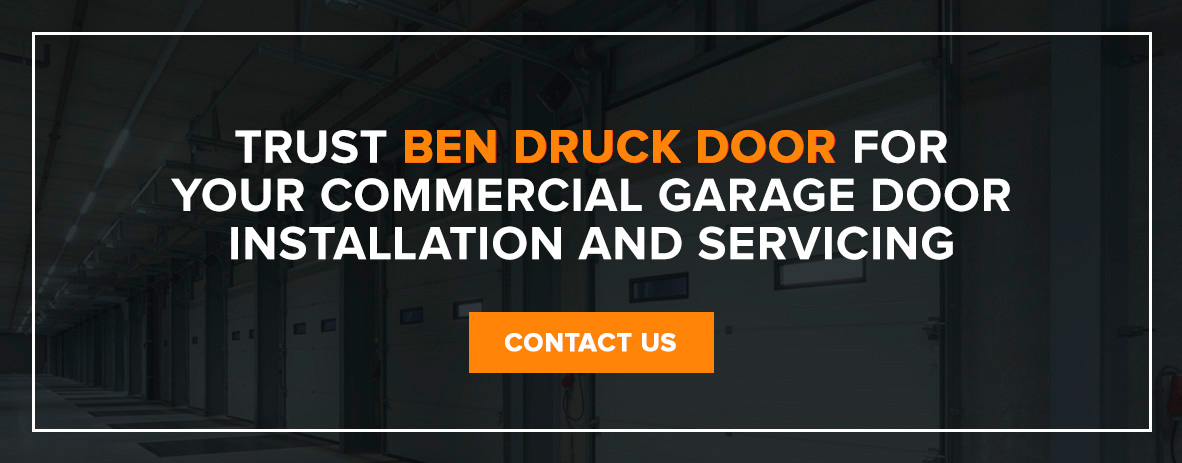
Ben Druck Door specializes in commercial garage door installation, repair and maintenance servicing, as well as fire door inspection and testing. We offer turnkey services, so you’ll never have to guess how much a job will cost — our transparent pricing includes everything from taxes to warranty coverage.
Explore our complete commercial door offerings and request an estimate today to get started.
Can You Open a Garage Door with a Broken Spring?
Can You Open a Garage Door with a Broken Spring?
It’s possible to open a garage door with a broken spring, but we don’t recommend it. Trying to lift a broken door with your garage door opener can damage the motor, and a manual lift can put you, bystanders, vehicles and pets in danger.
The Function of a Garage Door Spring
Garage door springs are essential to the operation of a garage door. These critical garage door parts:
Counterbalance the Door’s Weight
Garage door springs offer a counterbalance to the door’s weight, making it lighter to lift. For systems with an electric opener, garage door springs reduce strain and stress on the opener’s motor by helping to carry the door’s weight.
Help Control Operation
Springs help control the lifting and lowering process by ensuring smooth operation and helping roll-up doors to close softly. They also keep open doors securely in place, preventing them from crashing down on vehicles or operators.
Why You Shouldn’t Open a Garage Door With a Broken Spring
If you need to leave your property or access your garage urgently, you might be tempted to open a garage door with a broken spring. Opening the door on your own can have serious consequences. Here are three reasons you shouldn’t attempt to open a broken door.
1. A Broken Door Can Crash Down
When a garage door’s spring is broken, it leaves the weight unbalanced. When you try to open the door, it can suddenly shift without warning and fall, putting everyone nearby at risk of injury.
While you may be able to open a door with a broken spring, keeping it open would present yet another challenge. If you open a broken door, you’ll need to secure it, and few things are capable of supporting such immense weight without the risk of letting the door fall.
2. A Broken Door Is Heavy
Even single garage doors can weigh hundreds of pounds, and double garage doors or insulated models are even heavier. Garage door manufacturers ensure their products have appropriate springs that can bear the weight of a door. Lifting a garage door without functioning springs means you would have to lift and support significant weight, which could lead to serious injuries.
3. A Broken Door Can Cause Damage
If you try to open a door without a functioning counterbalance system, you can damage the door, the tracks and the automatic door opener. These issues can result in costly repairs, especially if you damage your opener.
We don’t advise trying to lift a broken door with your opener. If you do, you might:
- Strain to the opener: A garage door opener should not carry the entire weight of a door. Without the support of springs, the opener will have to work much harder to lift a door, which can shorten its life span or cause the motor to overheat and burn out.
- Lift the door unevenly: A garage door spring that is broken on one side can cause the opener to lift the door unevenly. This misalignment puts additional strain on your opener and can warp or bend your door.
How to Know If a Garage Door Spring Is Broken
To find out if your garage door springs are not functioning as they should, look for these signs:
- A gap in torsion springs: If your garage door operates on torsion springs — these springs run above your door — you might notice a break in the middle of the spring.
- Operational difficulties: Your door might only open a few inches or might lift unevenly.
- Problems using your garage door opener: If you hear your opener trying to lift your door but not succeeding, it might be due to a broken spring.
- A heavier door: A door with a broken spring will be much heavier to lift, and you might struggle to open it manually.
- A loud noise: When a spring breaks, you might hear a loud bang due to the release of tension.
Rely on Professionals for Garage Door Spring Replacement
Ben Druck Door has served customers since 1967. As a seasoned company, we offer a range of garage door services to homeowners and businesses, including quality garage door repairs.
Our technicians can diagnose and repair your door during one visit. If you have a broken garage door spring, you can confidently rely on us to replace it. To mitigate spring problems down the line, you can also rely on our thorough commercial and residential maintenance services.
Contact Ben Druck Door Today
Ben Druck Door is an efficient turnkey garage door company. We’re also a family-owned business — taking the time to build long-lasting relationships with our clients. If your garage door has a broken spring, request a service today or contact us online to find out more about our garage door offerings.

Importance of Fire Door Testing
Importance of Fire Door Testing
Fire safety is a top priority for every building. Fire prevention, detection and suppression systems, evacuation plans and emergency response procedures are critical components of a building’s fire safety. As part of evacuation plans, residential and commercial buildings must have fire doors to help contain the spread of fire and provide time for evacuation. However, simply having a fire door is not enough. Regular fire door maintenance, including testing and inspection, ensures fire door safety.
In this article, we’ll discuss fire door testing and inspection, including which parts are tested and the inspection steps. We’ll also cover the benefits of fire door testing.
What Is a Fire Door?
A fire door is a specialized door that slows down or prevents the spread of fire and smoke in a building. Constructed using fire-resistant materials such as steel, gypsum or wood with a fire-resistant core, these doors are equipped with self-closing mechanisms to ensure they remain closed during a fire. Fire doors are typically installed in critical areas of a building, such as stairwells, corridors and openings between different fire zones.
By creating a barrier between different building sections, fire doors help compartmentalize the space, limiting the spread of fire and smoke. This compartmentalization is crucial in providing occupants with safe evacuation routes and minimizing property damage. Fire doors also play a vital role in assisting firefighters by containing the fire to a specific area, making it easier to control and extinguish. Proper fire door maintenance is essential to ensure these doors perform their intended function and maintain optimal fire door safety.
Fire Door Testing and Inspection
Regular fire door testing and inspection are crucial aspects of fire door maintenance to ensure the effectiveness of these life-saving devices. The National Fire Protection Association (NFPA) requires fire doors to be inspected and tested periodically to ensure they meet safety standards. The testing frequency may vary depending on the door type, but annual fire door inspections are required.
During a fire door’s annual inspection, a certified technician thoroughly examines and tests various door components to ensure they function correctly and meet all safety requirements. This comprehensive inspection process, as part of regular fire door maintenance, helps identify any issues or defects that could compromise the door’s ability to effectively contain fire and smoke.
Components Inspected During a Fire Door Inspection
A fire door inspection involves a thorough examination of various components, including:
- Door frame: The inspector checks for any damage, warping or gaps that could allow fire and smoke to pass through. They ensure the frame is securely attached to the wall and the opening is properly sized for the door.
- Door leaf: The door itself is inspected for damage, warping or other issues that could affect its ability to close and latch properly. The inspector verifies that the door is constructed of the appropriate fire-resistant materials and labeled with the correct fire rating.
- Hinges and hardware: All hinges, handles, locks and other hardware are checked to ensure they are securely attached and functioning correctly. The inspector verifies that the hardware is appropriate for the door’s fire rating and that it does not interfere with the door’s operation.
- Seals and gaskets: The inspector confirms that all seals and gaskets around the door frame are intact and provide a tight fit to prevent the passage of fire and smoke. They check for any signs of damage or wear that could compromise the seal’s effectiveness.
- Self-closing mechanism: The door’s self-closing mechanism is tested to ensure it closes and latches the door properly from any position. The inspector checks that the closing speed is appropriate and that the door does not slam or close too slowly.
- Signage and labels: All required signage and labels are confirmed to be present and legible, including the door’s fire rating and any instructions for operation. The inspector ensures labels are securely attached and have not been tampered with or removed.
Fire Door Inspection Steps
A comprehensive fire door inspection is a critical aspect of fire door maintenance and typically involves several key steps:
- Visual assessment: The inspector visually examines the door and its components for signs of damage, wear or other issues that could affect its performance. They look for cracks, dents or corrosion on the door and frame and any missing or damaged hardware.
- Physical testing: The inspector physically tests the door’s operation, including opening and closing it to ensure it moves smoothly and without obstruction. They also check that the door does not bind or rub against the frame and that it latches securely when closed.
- Functional testing: To ensure they operate correctly, the inspector tests the door’s self-closing mechanism and any other functional components, such as panic hardware or automatic closing devices. They verify that the door closes and latches properly from any position and that the closing speed is appropriate.
- Drop testing: The inspector performs a fire door drop test for doors equipped with self-closing mechanisms to verify the door will perform as intended during an actual fire.
What Is a Fire Door Drop Test?
A fire door drop test is a critical component of the fire door inspection process and is essential for maintaining fire door safety. During a drop test, the technician releases the fire door from its fully open position and observes how it closes and latches. As part of the fire door drop testing requirements, the door must close and latch securely without any assistance or interference. If the door fails the drop test, it must be repaired or replaced immediately as part of the necessary fire door maintenance.
Drop tests should be performed annually for most types of fire doors, although some doors, such as rolling fire doors, may require more frequent testing based on their application or local regulations. Rolling fire doors, often used in industrial or commercial settings, have unique operating mechanisms that require specialized inspection and testing procedures, so rolling fire door inspections may be conducted more frequently.
Drop tests should be conducted by certified professionals with the knowledge and equipment to perform the test accurately and safely. Attempting to perform a drop test without proper training and expertise can lead to inaccurate results and potentially compromise fire door safety and the overall safety of the building and its occupants.
Benefits of Regular Fire Door Testing
Investing in regular fire door testing offers numerous benefits, including:
- Enhanced safety: Properly maintained fire doors help protect building occupants and minimize property damage in the event of a fire, ensuring optimal fire door safety.
- Compliance: Regular testing and inspection ensure fire doors meet all applicable safety standards and regulations, helping avoid costly fines and liability issues.
- Early problem detection: Identifying and addressing issues with fire doors early can prevent more serious and expensive problems down the line.
- Longer door life span: Regular inspection and maintenance can extend the life of fire doors, reducing the need for costly replacements and repairs.
- Peace of mind: Knowing that fire doors are functioning correctly and ready to perform their crucial role provides greater peace of mind.
Working with certified fire door inspectors and technicians ensures fire doors are thoroughly tested and maintained to the highest standards. These professionals possess the expertise and knowledge required to accurately assess fire doors’ condition and performance. They can identify potential issues early and recommend appropriate solutions to maintain fire door safety.
Schedule a Fire Door Drop Test Today
Regular fire door testing and inspection are essential to maintaining a building’s safety and compliance. At Ben Druck Door, our certified technicians specialize in comprehensive fire door testing services, including annual fire door inspections and fire door drop tests. With our expertise and commitment to fire door safety, you can trust that your fire doors will be ready to perform when it matters most.
Contact us today to schedule a fire door drop test and take a proactive step toward ensuring the safety of your building and its occupants.
Why Architects Should Connect With a Local Garage Door Company Before Starting a Project
As an architect, you know that every detail matters. Getting the right pieces for every project can make all the difference in function and design. While it’s the architect’s job to plan the project and bring it to life, getting expert advice can help make your vision successful.
Consulting a garage door company on your commercial project can help take your work to new levels of quality and durability. Here’s an architect’s guide for garage doors to help you exceed your client’s expectations.
1. Ensure a Good Fit
Commercial garage door consulting helps ensure you get the right door for your project’s needs. Commercial spaces often require doors that can withstand heavy use, survive harsh conditions and adhere to specific security standards. Garage door companies can help architects choose doors that fit their client’s criteria and the building’s design. Whether your project is a warehouse that needs strong doors for equipment access or a retail space that wants sleek, stylish designs, the right company can help you find what you need.
2. Get Access to Expert Advice
The commercial garage door design process varies depending on your needs. Garage door companies are experts in the process — they know the materials, mechanics and technology involved in garage doors. Consulting these experts gives you essential knowledge that makes your project exceed client expectations. From trends and sustainable materials to reliable security and door weight, expert advice can make your project better.
3. Get Custom Designs
Commercial projects often need more than off-the-shelf models. With so many niche industries needing garage doors, you must find options that meet client and regulatory requirements and blend into the building. Working with garage door companies helps you access custom designs for unique and high-end commercial projects. Instead of finding yourself limited by size, materials or style, you can get doors that perfectly match your project. Install innovative features or meet unique functional requirements easily with custom garage doors.
4. Avoid Roadblocks
Fitting garage doors into your project can lead to roadblocks without the right support. Technical tasks, such as leaving space for important mechanisms or integrating the garage with security systems, are easy to overlook. Closure type, mounting hardware and garage door strength all need to be figured out in advance to prevent delays. Involving a garage door company early helps ensure you address these details before they become problems. With proactive collaboration, you can avoid surprises and missed deadlines.
5. Save Time and Money
Consulting a garage door company can even save you money. With expert advice, you can get the doors you need from the beginning. You’ll avoid time-wasting delays, extra costs from incorrect components and misused resources. A garage door company will help you iron out your plans before installation, ensuring everything fits your client’s needs without driving up the project’s budget, waste and length.
Things to Consider During the Commercial Garage Door Design Process
Architects who get garage door design partners work with them to meet client needs. The garage door design process has to consider several factors to ensure the door meets building and user needs. Understanding all these factors will help you create a door that seamlessly works with the client’s building.
1. Material
Material is an essential choice for garage door designers. Garage door material directly impacts the door’s strength, look and maintenance needs. You need a door that can withstand everything the client wants during operations. Common materials include steel, aluminum and fiberglass — each has benefits and drawbacks, depending on its use. Review client requirements and work with your garage door company to find something that can withstand wear while complementing the project.
2. Purpose
What is the client’s garage door for? Purpose plays a significant role in the garage door’s effectiveness. How often will it be used? Is it for a secure storage facility? Does it need certain fire ratings to meet code standards? The purpose of your client’s garage door can tell you what materials, durability and operating mechanisms you need.
3. Location
Your project’s location will also influence the door you pick. Climate, local elements and natural disasters can all affect garage doors. Commercial garage doors need to withstand the wear and tear of local conditions. If hurricanes and earthquakes are common, you need doors rated to withstand certain pressures. If your client is by the ocean, you need a door that can handle wind, humidity and salt. The more extreme the weather conditions are, the stronger your doors must be to meet commercial standards.
4. Sustainability
Many commercial businesses want more sustainable options for their construction. As an architect, you might have to dive into eco-friendly materials for your client’s garage doors. Carbon footprint and energy efficiency are becoming increasingly popular considerations for all aspects of building design. For example, well-insulted garage doors help lower energy bills and increase thermal performance, making your construction project greener.
5. Design
Even though you’re working on commercial projects, design is still essential. The garage door you choose should complement the building’s overall architectural style and design. You’ll need to consider color, texture, hardware and more. Additionally, ask yourself, is the door a focal point, or does the client want it to blend into the background?
Building a garage door that looks good and works correctly is a big task — you’ll need to balance design with client needs and local regulations. Working with a garage door company lets you create custom designs that fit your vision and meet your client’s needs.
6. Code Requirements
You’ll also have to navigate local building codes and standards. Any safety regulations, accessibility standards and energy-efficient requirements need to be followed to protect safety and avoid fines. Working with a local garage door company is a great way to ensure you meet regulations. They know all the local rules and can help you incorporate these requirements into your project’s design.
Partner With Ben Druck Door on Your Next Garage Door Project
Looking to ensure your next garage door project exceeds expectations? Partner with Ben Druck Door for unmatched expertise and services in Southcentral Pennsylvania. We’ve been a trusted name in garage door installation, inspection and repair since 1967. From coiling to sectional garage doors, you can count on our expert team to get the job done right. With premium products and a professional team, our excellence is backed by a proven commitment to customer service.
Whether you’re in the planning stage or need project management and installation services, Ben Druck Door is here to help. Our commercial garage door services can provide the architectural design support to help you complete your project. We offer online resources to help architects deliver quality, effective projects. Explore our specs, product guides and drawings from leading manufacturers to ensure your client gets the garage door they need. Contact Ben Druck Door to discuss your garage door needs and experience lasting quality today!

